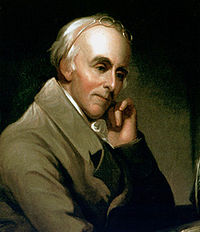
Heroic medicine
Encyclopedia

A similar term or expression was first used by the philosopher Immanuel Kant at the end of the third section of his book The Conflict of the Faculties, . Kant writes, "this, admittedly, is the quickest way of ending a conflict; but it is also (in medical terms) a heroic means - one that endangers life."
Benjamin Rush
Benjamin Rush
Benjamin Rush was a Founding Father of the United States. Rush lived in the state of Pennsylvania and was a physician, writer, educator, humanitarian and a Christian Universalist, as well as the founder of Dickinson College in Carlisle, Pennsylvania....
(1745–1813), who signed the American Declaration of Independence and is considered one of the “fathers" of American medicine, and who trained in medicine at Edinburgh University (1766–1768), strongly advocated “heroic medicine”.
During the "Age of Heroic Medicine" (1780–1850), educated professional physicians aggressively practiced "heroic medicine," including bloodletting
Bloodletting
Bloodletting is the withdrawal of often little quantities of blood from a patient to cure or prevent illness and disease. Bloodletting was based on an ancient system of medicine in which blood and other bodily fluid were considered to be "humors" the proper balance of which maintained health...
(venesection), intestinal purging (calomel
Mercury(I) chloride
Mercury chloride is the chemical compound with the formula Hg2Cl2. Also known as calomel or mercurous chloride, this dense white or yellowish-white, odorless solid is the principal example of a mercury compound...
), vomiting (tartar emetic), profuse sweating (diaphoretics) and blistering, stressing already weakened bodies. Physicians originally treated diseases like syphilis
Syphilis
Syphilis is a sexually transmitted infection caused by the spirochete bacterium Treponema pallidum subspecies pallidum. The primary route of transmission is through sexual contact; however, it may also be transmitted from mother to fetus during pregnancy or at birth, resulting in congenital syphilis...
with salve
Salve
A salve is a medical ointment used to soothe the head or other body surface. A popular eye medicine known as "Phrygian powder" was one of Laodicea's sources of wealth...
s made from mercury. While well-intentioned, and often well-accepted by the medical community, these treatments were actually harmful to the patient.

